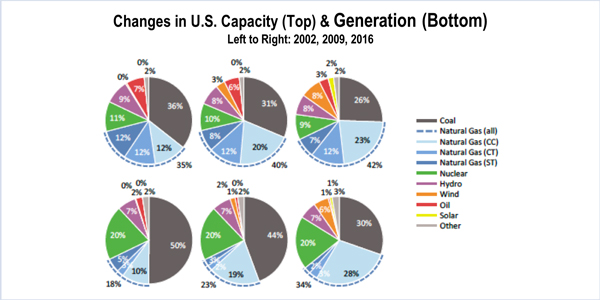By Tom Kleckner
With a permanent chairman and full complement of commissioners now in place, FERC will likely modify “and keep moving” the Department of Energy’s controversial proposal to offer price supports to coal and nuclear plants, according to one industry analyst.

Tezak | ClearView Energy Partners
Christine Tezak, managing director of research for ClearView Energy Partners, said Wednesday her firm expects the commission to acknowledge the administration’s concerns and to take some action on the department’s Notice of Proposed Rulemaking (RM18-1).
Chairman Kevin McIntyre, who was sworn in Dec. 7, requested a 30-day delay for FERC to address the NOPR, which was granted by Energy Secretary Rick Perry. The commission now has until Jan. 10 to take action. (See McIntyre Takes FERC Chair; Wins Delay on NOPR.)
“The NOPR DOE sent over articulates a pretty straightforward concern that closing [baseload] power plants is bad,” Tezak said during a Texas Renewable Energy Industries Alliance webinar on the proposal. “It couches that concern by saying there could come a day under extreme circumstances where we would be really sorry not to have those plants around.”
Given broad opposition to the NOPR, Tezak thinks Commissioners Cheryl LaFleur, Robert Powelson and Richard Glick would all like to set aside the directive. She said LaFleur and Powelson reportedly prefer to close the docket and issue a Notice of Inquiry to RTOs with a 90-day timeline. Glick is also thought to be amenable to that option, Tezak said.
“I’m not sure that’s going to control the day,” she said. “The chairman does set the agenda. We think a variety of unusual circumstances are likely driving the commission to keep moving on the proceeding and to be responsive to the DOE’s concerns.”

| DOE Staff Report
It’s “feasible” FERC could issue an Advanced Notice of Proposed Rulemaking or a revised NOPR and keep the docket open if McIntyre can persuade two commissioners that action is required, Tezak said. “A revised rulemaking is not a final rule.”
Base on comments filed, Tezak said FERC has several other options to consider besides adopting the NOPR as written — unlikely, she said, given its lack of support and criticism for being vague:
- To “go even bigger” and offer 15-year cost-of-service contracts to all coal- and nuclear-fired generators;
- Adopt cost-of-service payments now and devise a permanent fix later;
- Revise or refine the NOPR, define “resiliency” and procure it starting in 2019;
- Study first, and act later; and
- Just say “no” and close the docket.
While serving as interim chairman before McIntyre’s arrival, Commissioner Neil Chatterjee proposed a “show cause” order requiring grid operators to compensate resources that may provide resilience benefits and are at risk of retirement as an interim measure while the commission conducts a longer-term rulemaking.

Silverstein | © RTO Insider
“With apologies to Lynyrd Skynyrd, we called the variant Neil Chatterjee seemed to endorse ‘Gimme Two Steps,’” Tezak said. “[The NOPR] is a very, very broad proceeding, notwithstanding the criticism. It’s not a popularity contest or an election. Expert opinions matter, and there is a lot of different evidence in the docket. Looking ahead, that’s important to consider even if [many parties] would like to see FERC shelve the whole mess and move on.”
Industry consultant Alison Silverstein, who — “through a bizarre chain of events” — helped organize and write the DOE’s “Staff Report on Grid Reliability and Markets,” referred to the NOPR’s “premature” retirements of baseload plants as “road kill.”

| DOE Staff Report
“The DOE staff said there was no such thing as premature retirements,” Silverstein said during the webinar. “If you believe in markets, then those things retired when they were no longer needed. Almost all of them retired because they were no longer economic.”
The root causes — low natural gas prices and the growth of renewables — were so obvious, the DOE report did not address them, Silverstein said.
She defined grid resiliency as the system’s ability to absorb, restore and quickly recover from major adverse events. Reliability has short-term (withstanding sudden disturbances) and long-term (resource adequacy) dimensions, Silverstein said.
“It’s important to articulate the problem we’re trying to solve here,” she said. “Resiliency and reliability is very different for a power plant than the grid as a whole. For my money, we can buy a lot of transmission and distribution improvements and provide economic support for coal miners for the billions of dollars it would cost to subsidize uneconomic coal and nuclear plants.”




